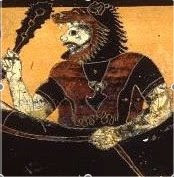So what did we learn from the first debate? There was some good stuff. We learned that McCain is just as fond of repeating jokes as his running mate. We learned that Obama agrees with McCain on a lot of stuff. McCain really, really doesn't like those earmarks, and Obama was really really against invading Iraq. Oh, and have the same taste in bracelets. Great. But the interesting stuff was in the little details. Like Georgia.
McCain used his reaction to the Russian military operations in Georgia as an instance of his greater strength and experience in foreign policy, or rather, in what has come to be his signature style in this campaign, he used it as an attack on Obama’s strength and experience. Certainly the immediate reactions of the two candidates offered a contrast. McCain immediately denounced Russia as aggressors, whereas Obama called for a cessation of hostilities from both sides. McCain sees this as one point to him.
If you're nostalgic for the cold war, McCain's fist-shaking had a comfortable feel to it. He took an immediate tough stand, and if Russia had out of the blue sent troops in Georgia, a little futile knee-jerk blustering might have been warranted. What actually happened in Georgia wasn’t so simple.
Intense fighting between Georgian troops and South Ossetian separatists broke out on 1 August after two roadside bombs injured five Georgian police officers. Russia moved its troops closer to the border and warned that it would intervene in the event of a military conflict. On 6 August the Georgian military began directing sporadic heavy shelling and sniper fire at Tskhinvali, the breakaway republic’s capital. Georgian President Saakashvili announced a day later that he intended to restore Tbilisi's control over South Ossetia and Abkhazia by force, in spite of the carefully crafted 1992 cease-fire and the presence of peacekeeping troops. Heavy shelling resumed after a brief lull, and a full scale Georgian military offensive against Tskhinvali began the following morning (8 August). Russian troops poured into South Ossetia and Georgia proper, and the rest is history.
The conflict in Georgia has roots extending back into Russian imperial history, and its recent history involves many of the same complex questions of ethnicity and national identity, of the right to self-determination, of the desirability and tenability of multi-ethnic democracy that plagued the former Yugoslavia. It is a messy business. So how should a US President respond in the first instance – before all the facts are clear - when he hears that a small ally deliberately violates a cease-fire and is subjected to exactly the sort of asymmetrical response that it knew to expect from the overwhelmingly superior army of its hostile and ruthless neighbor?
He should tell both sides to stand down, let the dust settle, and work behind the scenes in cooperation with our other allies for a just and durable settlement. Georgia was wrong to send its troops into Tskhinvali. Russia was even more wrong to respond with such overwhelming force into the heard of Georgia itself. Both sides needed to be told to hold their fire; and that is precisely what Obama did.
McCain, on the other hand, went with his gut reaction against his old enemy Russia. No caution or nuance here – those Ruskies are trouble, always have been. McCain’s immediate good guy/bad guy posturing sends a dangerous signal to our allies. It says: Go ahead, be reckless, we’ll still take your side and bail you out. It’s a bad enough message when sent to overreaching investment banks, but when applied to foreign policy it demonstrates a naïve willingness to be manipulated, and only encourages troubled regimes to provoke international incidents with our rivals to provoke US involvement. We have a right to expect better of our allies, and a responsibility to react to international crises with a calm sense of authority.
Perhaps this is why the current US President’s response was more in line with that of Obama than that of McCain, calling for “an immediate halt to the violence and a stand-down by all troops.” McCain criticizes Obama’s immediate reaction, but the facts were complex and as yet unclear. Obama’s reaction was responsible and nuanced. McCain’s response was naïve, reckless and, certainly for a man claiming such lofty foreign policy credentials, nothing to crow about.
Saturday, September 27, 2008
Subscribe to:
Post Comments (Atom)


No comments:
Post a Comment